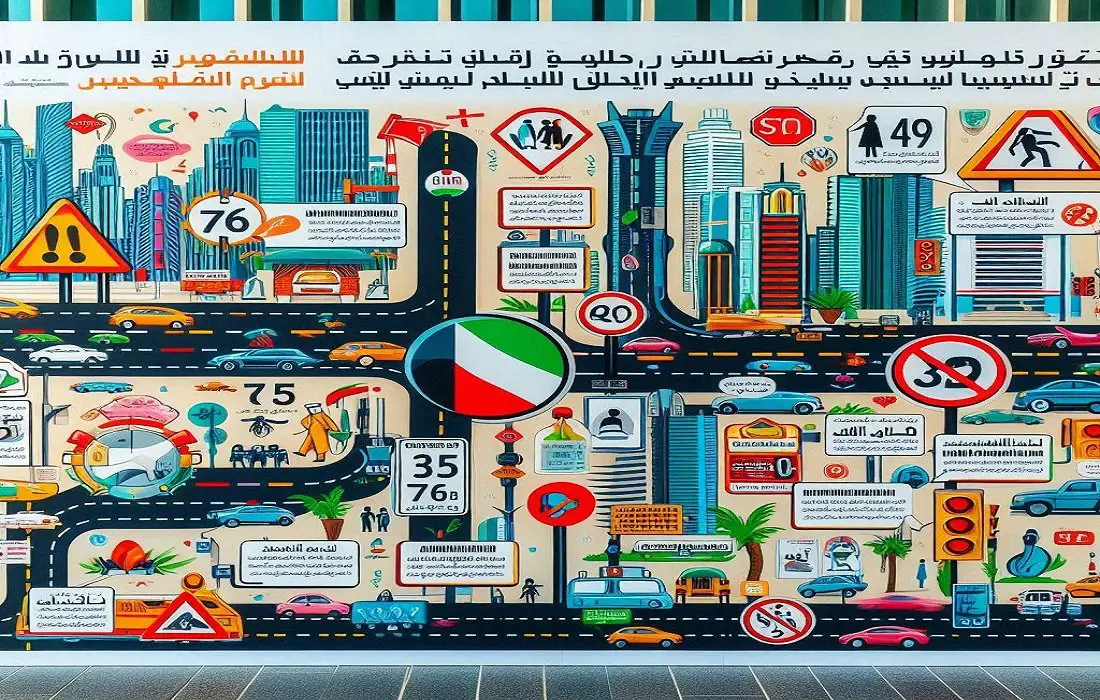Driving in the UAE is a unique experience, with each emirate enforcing strict road safety standards to ensure a smooth flow of traffic. Whether you’re a resident or a visitor, understanding UAE road rules is crucial for safe driving and avoiding hefty fines. This guide provides an overview of the essential road rules in the UAE, emphasizing the regulations in major cities like Dubai and Abu Dhabi.
Introduction to UAE Road Rules
The driving rules in the UAE have been designed to promote road safety and prevent accidents. The country’s road network is one of the most modern in the world, with wide highways and well-maintained roads. However, due to the high speed limits and busy traffic, particularly in cities like Dubai and Abu Dhabi, adhering to the traffic rules is paramount.
In 2024, the new traffic rules in the UAE reflect an increased focus on road safety and stricter penalties for violations. These changes aim to reduce accidents and improve road safety across the Emirates. It’s essential for drivers to stay updated on these regulations, whether they’re long-term residents or new arrivals.
Why UAE Road Rules Are Important
The UAE has experienced rapid urbanization, making the enforcement of traffic rules more crucial than ever. Authorities in each emirate—Dubai, Abu Dhabi, Sharjah, and others—enforce strict rules to curb reckless driving, over-speeding, and traffic violations. Understanding these rules not only helps you avoid hefty fines but also ensures your safety and that of other road users.
Read More:How to UAE Driving License File Opening: A Comprehensive Guide
Key UAE Road Rules You Should Know
Here are some of the most important UAE road rules that every driver should be aware of:
1. Speed Limits
Speeding is a common issue in the UAE, and the penalties for over-speeding are severe. Dubai road rules specify speed limits for different areas: 60-80 km/h on urban roads, up to 100 km/h on highways, and 120-140 km/h on freeways. Similarly, Abu Dhabi road rules have strict enforcement of speed limits with heavy fines and even vehicle impoundment for repeat offenders.
2. Seatbelts Are Mandatory
Wearing seatbelts is mandatory for all passengers, not just the driver. Failing to comply can result in fines and black points on your driving record. This applies to both front and rear seat passengers, a rule that is strictly enforced in all emirates, particularly Dubai and Abu Dhabi.
3. No Mobile Phone Usage While Driving
Using mobile phones while driving is one of the most common traffic violations in the UAE. Authorities enforce strict penalties, including heavy fines and black points. If you must use your phone, you should use hands-free devices to avoid any penalties.
4. Right of Way at Roundabouts
Roundabouts are common on UAE roads, and understanding how to navigate them is essential. According to Dubai traffic rules, vehicles inside the roundabout have the right of way, and drivers entering the roundabout must yield to those already circulating.
5. Strict Regulations on Drunk Driving
The UAE has a zero-tolerance policy for driving under the influence of alcohol. Any amount of alcohol in your system while driving can result in severe penalties, including hefty fines, black points, and imprisonment. It is crucial to avoid driving if you’ve consumed any alcohol.
6. Parking Rules
Illegal parking is another violation that could lead to hefty fines. Always ensure you park in designated areas and follow parking signs. Abu Dhabi traffic rules and Dubai traffic rules both have regulations that prohibit parking in restricted zones, which could result in your vehicle being towed or fined.
Road Safety Rules in UAE
The UAE government, in collaboration with local authorities, runs several road safety campaigns to educate drivers about the importance of road safety rules. Here are some additional safety rules every driver should follow:
- Always indicate when changing lanes: Failure to indicate can lead to accidents, and it’s considered a serious violation.
- Keep a safe distance: Tailgating is strictly prohibited, and fines are imposed for not maintaining a safe distance between vehicles.
- Adhere to pedestrian crossings: Pedestrians have the right of way at designated crossings, and drivers must stop when approaching these areas.
New Traffic Rules in UAE 2024
In 2024, the UAE introduced new traffic rules aimed at enhancing road safety. Some of the key changes include:
- Increased fines for over-speeding: Fines for speeding violations have been increased, with stricter penalties for excessive speeding.
- Enhanced penalties for reckless driving: The government has implemented harsher punishments for reckless driving, including impounding vehicles for repeat offenders.
- Black points system: The UAE’s black points system has been updated, where accumulating a certain number of points can lead to a driving ban.
Staying informed about these new traffic rules will help you avoid penalties and contribute to a safer driving environment.
Traffic Rules in Dubai and Abu Dhabi
Both Dubai and Abu Dhabi have their own sets of rules, which align closely with federal UAE regulations but may include specific variations.
Traffic Rules in Dubai
Dubai has a well-developed road network, but it’s essential to follow the Dubai road traffic rules closely. Violations such as using mobile phones, speeding, or failing to wear a seatbelt are met with heavy fines. You can also download the Dubai driving rules PDF from the official government portal to stay updated.
Abu Dhabi Traffic Rules and Fines
In Abu Dhabi, traffic fines are equally strict, with particular attention to parking violations, speeding, and reckless driving. The Abu Dhabi traffic rules and fines system is designed to ensure that all drivers comply with the regulations, and offenders face severe penalties.
The Role of Local Bloggers in Promoting Road Safety
If you’re looking for up-to-date information on UAE road rules or expert advice on safe driving, local bloggers play a crucial role in educating the community. Many UAE-based bloggers provide:
- Road safety tips
- Latest updates on traffic rules
- Guides on avoiding fines and penalties
- Resources such as downloadable PDFs for traffic rules
By following local blogs, you can stay informed on the latest changes to Dubai traffic rules, and learn more about driving culture in the UAE.
Call to Action: Stay Safe, Stay Informed!
If you’re keen on staying updated with the latest UAE road rules and ensuring a safe driving experience, be sure to follow trusted local bloggers who regularly share insights, guides, and updates on traffic regulations. Their expert advice can help you navigate the complexities of driving in Dubai and Abu Dhabi, while avoiding costly mistakes.
Start your journey to safe driving today by exploring the latest tips and updates on local driving blogs!
Conclusion
Driving in the UAE requires a thorough understanding of the country’s road and traffic rules. Whether you’re driving in Dubai or Abu Dhabi, staying informed about the latest traffic rules and fines can help you avoid penalties and ensure a safer driving experience for everyone. Always keep in mind the road safety rules in the UAE, follow speed limits, and be cautious of other road users to contribute to safer roads in the Emirates.
FAQ
What is the main road rule in the UAE?
The key road rule in the UAE is strict adherence to speed limits. Different roads have different limits, and drivers must follow them to avoid accidents and fines. Speeding is heavily monitored by cameras, and exceeding limits can lead to penalties such as fines, black points on your license, or even vehicle impoundment.
What is prohibited on the highway in the UAE?
On UAE highways, reckless driving, tailgating, and using mobile phones without a hands-free device are strictly prohibited. These actions can result in heavy fines and black points. Drunk driving is also strictly banned, with zero tolerance for any alcohol consumption while driving.
Is it difficult to drive in the UAE?
Driving in the UAE is generally straightforward, thanks to well-maintained roads and clear signage. However, adjusting to high-speed limits and heavy traffic, especially in cities like Dubai and Abu Dhabi, can be challenging for new drivers. Being aware of the rules makes driving much easier.




